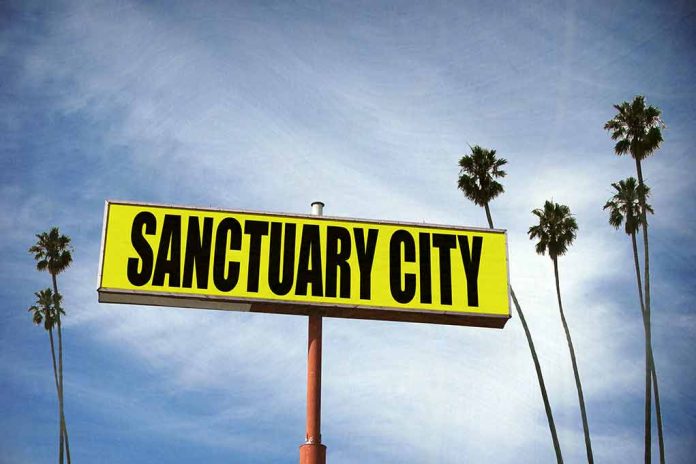
Trump’s incoming “border czar” Tom Homan plans to cut federal funding to states that do not cooperate with mass deportations of undocumented migrants, setting the stage for a fierce battle with sanctuary cities.
At a Glance
- Tom Homan, Trump’s border czar pick, aims to cut funding for non-cooperative states
- Sanctuary cities and states are expected to resist, with legal challenges anticipated
- Homan prioritizes deporting public safety and national security threats
- Democratic-run cities and states have passed ordinances to resist federal immigration efforts
- Approximately 13 million undocumented immigrants currently reside in the US
Trump Administration’s Aggressive Stance on Immigration
The Trump administration is gearing up for a showdown with sanctuary cities as it prepares to implement a stringent immigration policy. Tom Homan, the incoming “border czar,” has unveiled plans to leverage federal funding as a means to compel states into compliance with mass deportation efforts. This approach is expected to face significant resistance from states like California, Illinois, New Mexico, and Arizona, with legal challenges on the horizon.
Homan’s strategy involves using the US military for deportations and employing federal funding as a bargaining chip against non-cooperative jurisdictions. The administration’s focus is on deporting individuals who pose threats to national security or public safety, with Homan encouraging undocumented immigrants to “self-deport” to avoid long-term legal consequences.
Sanctuary Cities Push Back
Democratic-run cities and states, including Los Angeles, have already passed ordinances to resist federal immigration efforts. This resistance is not limited to the West Coast, as evidenced by Boston’s city council unanimously voting to obstruct Trump’s deportation efforts. Key Democratic figures opposing the plan include Denver Mayor Mike Johnston, Massachusetts Gov. Maura Healey, and Arizona Gov. Katie Hobbs.
Homan has taken a hard line against sanctuary cities, criticizing them for being protective of criminals and warning of increased ICE presence if they continue to obstruct federal efforts. He has been explicit in his message to sanctuary city leaders, stating that it is a felony to conceal or harbor illegal aliens.
Deportation Plans and Challenges
The Trump administration’s mass deportation plan faces potential logistical and financial challenges, despite lower border detentions under the current Biden administration. Homeland Security Secretary Alejandro Mayorkas attributes the decrease in unlawful crossings at the US-Mexico border to new removal capabilities, legal pathways, and actions against smuggling groups.
Homan has outlined a three-pronged approach to address immigration issues: securing the border, executing deportation operations, and locating approximately 300,000 unaccompanied minors who have entered the country. He advocates for local law enforcement to cooperate with ICE by handing over illegal immigrant criminals for deportation.
Implications for Undocumented Immigrants
For the estimated 13 million undocumented immigrants in the US, the Trump administration’s policies present significant challenges. Deportees face difficult decisions, including whether to leave their US citizen children in the country or take them along. Homan has advised undocumented immigrants to consider voluntary departure to avoid potential long-term legal consequences.
As the Trump administration prepares to implement its aggressive immigration policies, the stage is set for a contentious battle between federal authorities and sanctuary cities. The outcome of this conflict will have far-reaching implications for millions of undocumented immigrants and the communities that have chosen to protect them.
Sources:
Trump’s ‘border tsar’ vows to cut funding to ‘sanctuary’ states
Incoming border czar warns sanctuary city mayors ‘Get the hell out of the way’ or be prosecuted














